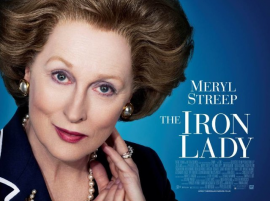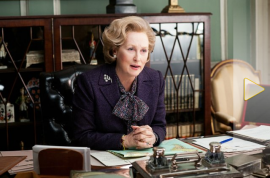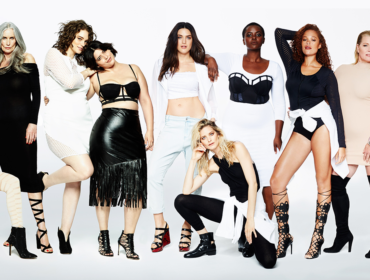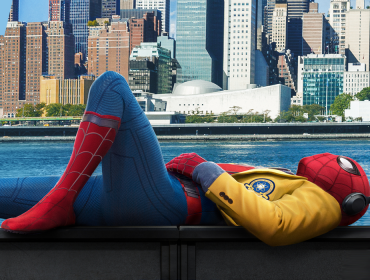By Covert Agent

Meryl Streep wears Lanvin's first-ever eco-friendly gown created from Eco Certified Fabric
Los Angeles — The leading lady nod for Best Actress in a Leading Role went to veteran actress Meryl Streep for her role as British Prime Minister Margaret Thatcher in "The Iron Lady." This is Streep's third Oscar, and well deserved. Here is a backstage interview with the talented actress at the 84th Academy Awards, shared by an undisclosed covert agent.
Covert Agent: Congratulations.
MS: Gracias. Thank you.
CA: Any Spanish?
MS: No.
CA: I wanted to ask you about what you said on stage because you said that it would probably be your last time there winning an Oscar?
MS: Yes, I'm pushing the tolerance.
CA: Maybe you don't want to give Katharine Hepburn a run for her money?
MS: Did she have more?
CA: Four.
MS: Oh, well, okay.
CA: How did you feel winning this third award, and what did you think?
MS: Oh, I was thrilled. I thought I was so old and jaded, but they call your name, and you just go into sort of a, I don't know, a white light. And it was just thrilling. It was like I was a kid again. I mean, it was, I was a kid when I won this, like, 30 years ago. Two of the nominees were not even conceived. So, you know, it was great. And it was doubly wonderful because my long time collaborative colleague, Roy Helland, makeup man, hairdresser, he won too … with his colleague Mark Coulier, who is a great British prosthetics designer, but he won not for some, you know, monster making, but for making a human being, and it's very unusual in that branch that they give it to somebody who's just trying to transform people. And so I was really, really proud for him.
I had become acclimated to not looking at Margaret Thatcher in the mirror and thought it was me, and that was important to me that I wasn't looking at rubber, that I was looking at me.

CA: Can you describe that moment when you first looked in the mirror and saw the face of Margaret Thatcher looking back at you?
MS: Well, by the time we had achieved the right amount of less, and less, and less, I had become acclimated to not looking at Margaret Thatcher in the mirror and thought it was me, and that was important to me that I wasn't looking at rubber, that I was looking at me. You know, at that point in the process of creating a character, I'd already sort of morphed in a way, in my head, and in my heart, with her, and her concerns and her interests, her zeal, her mission, her sense of rightness, and all of that. But honestly, when we first had the old age makeup on, I saw my dad. I looked so much like my dad. Maybe my dad looked like Margaret Thatcher, I don't know.
CA: You won for Kramer vs. Kramer for the very first time, and then Sophie's Choice, and now for Iron Lady. Talk about those different experiences in getting up there and accepting … what was it like the first time around and the second time around and is this better in some way?
MS: I read a poem yesterday, and it had nothing to do with this but one of the lines jumped out and it said, "It is strange to be here once as it is to return." So, that's true. It is strange, the whole thing is strange.
CA: Meryl, you said earlier that you were wearing a brand of shoes favored by Margaret Thatcher.
MS: Yes.
CA: Do you think wearing those shoes brought you some good luck? And also, Mrs. Thatcher liked a little whiskey at night. Are you going to have a couple tonight to celebrate?
MS: I am going to start with a couple. And then we will see if I can walk on the Ferragamos. Yes, Mrs. Thatcher wore those shoes.
CA: In researching your role, did you have a chance to meet Margaret Thatcher?
MS: No, I haven't. Really, she has retired from public life almost entirely now in the last two years. So, no, I didn't. But I studied her, and I studied, you know, there's so much archival footage. And then the challenge was to imagine her present life, and that was completely an active imagination on Abi Morgan, the writer's part, and my part, but there was a lot of freedom in that, but also responsibility to a real person and to history. So, it was really very, very satisfying as an actor, as an artist, to make a film that starts out about Margaret Thatcher and ends up being really about all of us.

CA: You have a very good relationship with a lot of staff member as well as your family. What is the trick of sustaining such a deep, good relationship in such a busy life?
MS: You can ask every working woman that question and get a million different answers because it's the juggle and the challenge that we have, but honestly, in my life, because it's in the arts, I don't go to work every day. So my day has been more flexible than other working women. Even when I was young and broke, I was only working for four months at a time, and I was unemployed. So my children never knew when I was going to be home. It was very valuable. But, you know, I think it's a struggle. And it's an ongoing struggle. Women have to do it all, you know. And so, the more flexible work becomes, the more engaged the dads become, the better.
CA: In your very moving speech this evening, you mentioned jokingly we might all be sick of you in the future. I hope that doesn't happen, but it seems like you have the beginning of a second project in life with The Women's Museum. Would you talk a little bit about that?
MS: Thank you for asking about that. There is no national women's history museum, but there is a lot of history that is not written about the contributions of women in our country and around the world. And I think it would be really, really inspiring for people all around the world to have this fantastic center where you can learn the stuff that hasn't been written about women, because for many, many centuries, history was not interested in us. Our history is invisible and I think it would be great for boys and girls to go to a place where they could learn about the contributions of their foremothers as well as their forefathers.
CA: Expounding on that idea, with young girls today, young women watching the Oscars, what advice would you give to them if they are thinking about going into filmmaking or acting?
MS: Or anything.
CA: Or anything?
MS: Or anything. Never give up. Don't give up. Many girls around the world live in circumstances that are unimaginably difficult. Show business is a golf game compared to the way most kids grow up in the world. But I would say never give up. On March 8th, 9th, and 10th, Tina Brown is hosting something called Women in the World in New York, a three day symposium bringing activists around the world on behalf of issues concerning women and girls, and it's a great, great thing.




